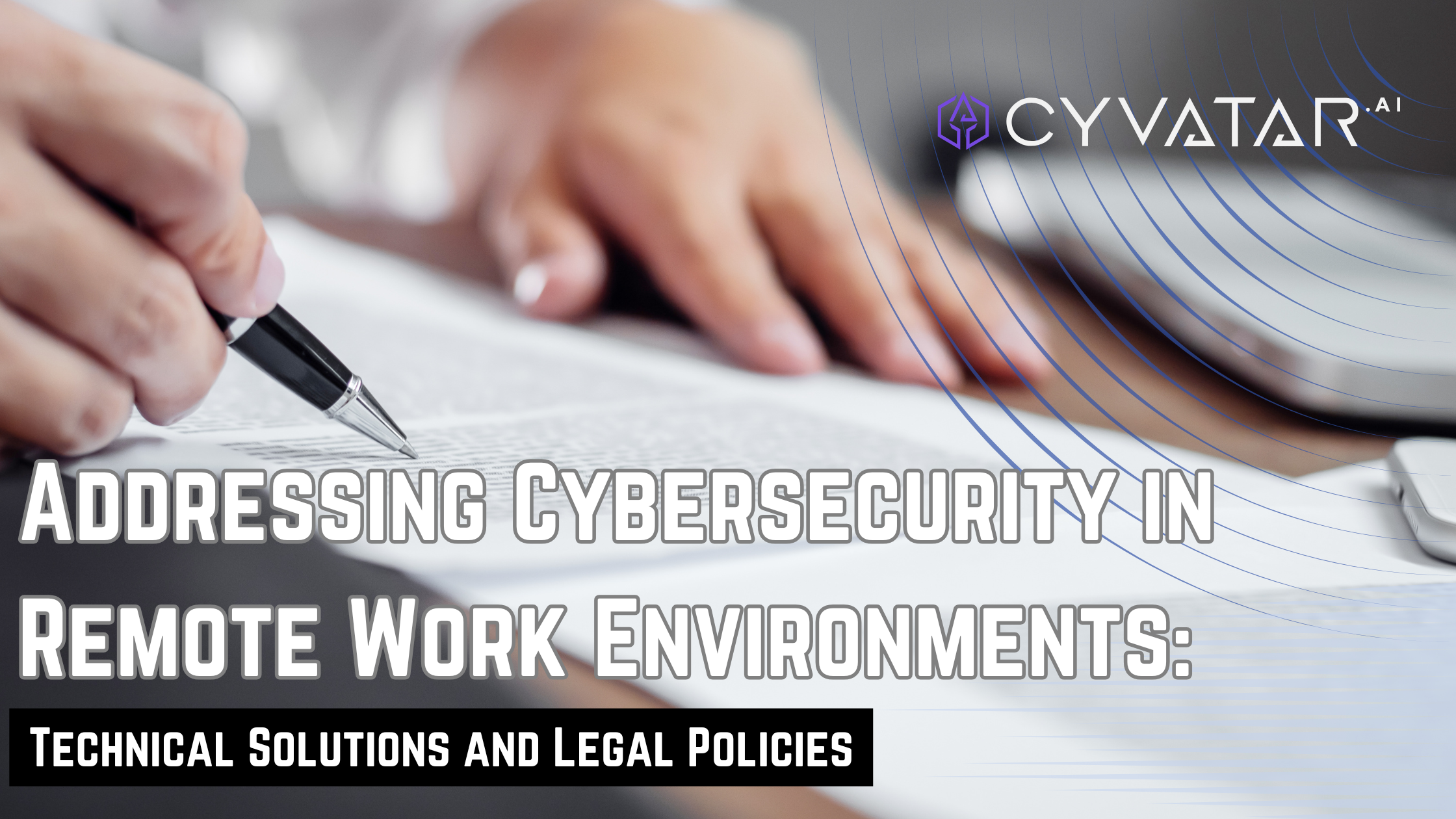Addressing Cybersecurity in Remote Work Environments: Technical Solutions and Legal Policies

Addressing Cybersecurity in Remote Work Environments: Technical Solutions and Legal Policies
Courtney Pereira | 12/03/2024The rise of remote work has transformed the modern workplace, offering flexibility and increased productivity for employees. However, it has also introduced new cybersecurity challenges that businesses must address to protect sensitive data and ensure compliance with legal requirements. This guide explores the essential technical solutions and legal policies necessary to secure remote work environments effectively.
Technical Solutions for Securing Remote Work
1. Virtual Private Networks (VPNs)
A Virtual Private Network (VPN) is crucial for securing remote connections. VPNs encrypt internet traffic, making it difficult for cybercriminals to intercept and access sensitive data. Key considerations include:
- Strong Encryption: Use VPNs with strong encryption standards, such as AES-256, to ensure data security.
- Reliable Providers: Choose reputable VPN providers with a track record of reliability and security.
- Always-On VPNs: Implement policies requiring employees to use VPNs for all work-related activities, especially when accessing company resources from public or unsecured networks.
2. Secure Access Controls
Controlling access to company resources is vital for remote work security. Best practices include:
- Multi-Factor Authentication (MFA): Require MFA for accessing sensitive systems and data to add an extra layer of security.
- Role-Based Access Control (RBAC): Implement RBAC to ensure employees have access only to the information and systems necessary for their roles.
- Regular Access Reviews: Conduct periodic reviews of access permissions to ensure they are up-to-date and aligned with current job responsibilities.
3. Endpoint Security
Securing devices used by remote employees is critical. Endpoint security measures should include:
- Anti-Malware Software: Install and regularly update anti-malware software on all devices to protect against malicious threats.
- Firewall Protection: Enable and configure firewalls to block unauthorized access to devices.
- Device Encryption: Encrypt data stored on devices to protect it in case of loss or theft.
4. Secure Collaboration Tools
Remote work often involves using various collaboration tools. To ensure these tools are secure:
- Choose Trusted Platforms: Select collaboration tools from reputable providers that prioritize security.
- Enable Security Features: Use built-in security features, such as end-to-end encryption, and ensure they are enabled.
- Monitor Usage: Regularly monitor the usage of collaboration tools to detect and respond to any suspicious activities.
5. Regular Security Training
Employee awareness is a key component of remote work security. Training programs should cover:
- Phishing Awareness: Educate employees on recognizing and avoiding phishing attacks, which are common in remote work environments.
- Secure Practices: Teach employees about secure internet practices, including using strong passwords and avoiding suspicious links.
- Incident Reporting: Encourage employees to report any security incidents or suspicious activities immediately.
Legal Policies for Securing Remote Work
1. Remote Work Security Policy
A comprehensive remote work security policy is essential for setting clear expectations and guidelines. This policy should include:
- Device Usage: Outline the acceptable use of company devices and personal devices used for work.
- Access Control: Specify requirements for accessing company systems, including the use of VPNs and MFA.
- Data Protection: Detail measures for protecting sensitive data, including encryption and secure data handling practices.
2. Data Protection Compliance
Ensure compliance with data protection laws and regulations, such as GDPR, CCPA, and HIPAA. Key steps include:
- Privacy Policy Updates: Update privacy policies to reflect remote work practices and ensure they comply with applicable laws.
- Data Processing Agreements: Implement data processing agreements with third-party service providers to ensure they comply with data protection requirements.
- Employee Training: Provide regular training on data protection laws and company policies to ensure employees understand their responsibilities.
3. Incident Response Plan
An incident response plan tailored to remote work scenarios is crucial for managing security incidents effectively. This plan should include:
- Incident Reporting: Establish clear procedures for reporting security incidents, including contact points and communication protocols.
- Response Procedures: Outline steps for containing, investigating, and mitigating security incidents in a remote work context.
- Communication Strategy: Develop a communication strategy for informing affected individuals, stakeholders, and regulatory bodies as required.
4. Legal Liability and Insurance
Understanding and managing legal liability is vital for remote work security. Considerations include:
- Liability Clauses: Review and update liability clauses in employment contracts to address remote work scenarios.
- Cyber Insurance: Obtain cyber insurance coverage that includes protection against remote work-related incidents, such as data breaches and cyberattacks.
- Legal Counsel: Consult with legal experts to ensure all remote work policies and practices are compliant with relevant laws and regulations.
5. Confidentiality Agreements
Ensure that employees sign confidentiality agreements that include provisions specific to remote work. These agreements should:
- Define Confidential Information: Clearly define what constitutes confidential information and the employee’s responsibility to protect it.
- Non-Disclosure Obligations: Outline non-disclosure obligations and the consequences of failing to comply.
- Remote Work Provisions: Include specific provisions related to the secure handling of confidential information in a remote work environment.
Conclusion
Securing remote work environments requires a combination of robust technical solutions and well-defined legal policies. By implementing advanced security measures such as VPNs, MFA, and endpoint protection, businesses can protect their remote workforce from cyber threats. Simultaneously, establishing comprehensive legal policies ensures compliance with data protection laws and mitigates legal risks. A proactive approach to remote work security not only safeguards sensitive data but also enhances overall business resilience.
